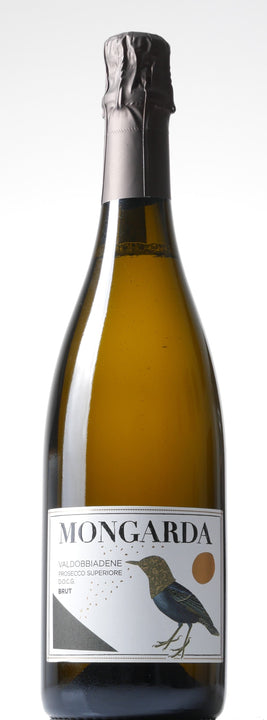MON0223SP
Brut Millesimato
2023
Veneto
Organic Farming
Biodynamic farming
Wild yeasts
No Sulphur
Vegan
Prosecco DOC / Prosecco DOCG is quickly becoming the most recognisable sparkling wine in the world, if not already the most produced. Made from the Glera grape and coming from 9 regions spanning the Northern Italian regions of Veneto and Friuli, it is the defacto go to sparkling wine. Unlike Champagne or Cava, Prosecco's second fermentation takes place in a steel tank (Charmat / Martinotti method) meaning it is comparatively cheaper, less complex and lighter. But with cheap production methods and off the chart exports many producers are trying reinstate Prosecco as a wine of quality, making them with ancient techniques (Col Fondo) or with greater complexity and tighter regulations (Prosecco Superiore DOCG).
Mongarda only started back in 1978 when Bruno, having picked up bits and bobs on winemaking from his grandfather, decided to give it a go and bought a single vineyard with his wife Marinella; it was called Mongarda. Now the 10 hectare estate, spread around the village of Col San Martino and in the heart of the Valdobbiadene-Conegliano Prosecco Superiore zone, is run by their son Martino who has maintained their ethos of natural, simple, low intervention winemaking. The majority of the vineyards are on steep slopes with old vines (the Mongarda vineyard dates from the 1950's) and poor, lime conglomerate rocky soils where they pick and ferment ancient permitted Prosecco varieties, Perera, Verdiso, Bianchetta, and Boschera together with Glera.

Wine details
MON0223SP
Mongarda
Brut Millesimato
2023
Veneto
Organic Farming
Biodynamic farming
Wild yeasts
No Sulphur
Vegan
Prosecco DOC / Prosecco DOCG is quickly becoming the most recognisable sparkling wine in the world, if not already the most produced. Made from the Glera grape and coming from 9 regions spanning the Northern Italian regions of Veneto and Friuli, it is the defacto go to sparkling wine. Unlike Champagne or Cava, Prosecco's second fermentation takes place in a steel tank (Charmat / Martinotti method) meaning it is comparatively cheaper, less complex and lighter. But with cheap production methods and off the chart exports many producers are trying reinstate Prosecco as a wine of quality, making them with ancient techniques (Col Fondo) or with greater complexity and tighter regulations (Prosecco Superiore DOCG).
Mongarda only started back in 1978 when Bruno, having picked up bits and bobs on winemaking from his grandfather, decided to give it a go and bought a single vineyard with his wife Marinella; it was called Mongarda. Now the 10 hectare estate, spread around the village of Col San Martino and in the heart of the Valdobbiadene-Conegliano Prosecco Superiore zone, is run by their son Martino who has maintained their ethos of natural, simple, low intervention winemaking. The majority of the vineyards are on steep slopes with old vines (the Mongarda vineyard dates from the 1950's) and poor, lime conglomerate rocky soils where they pick and ferment ancient permitted Prosecco varieties, Perera, Verdiso, Bianchetta, and Boschera together with Glera.
